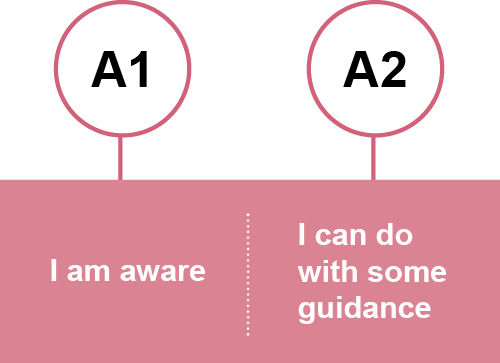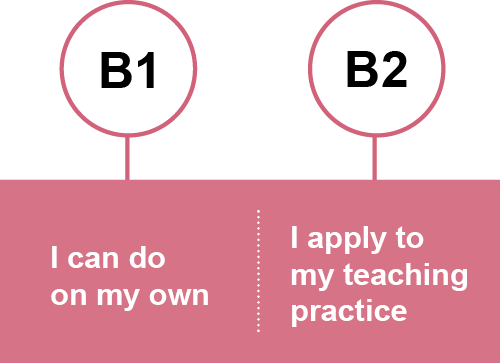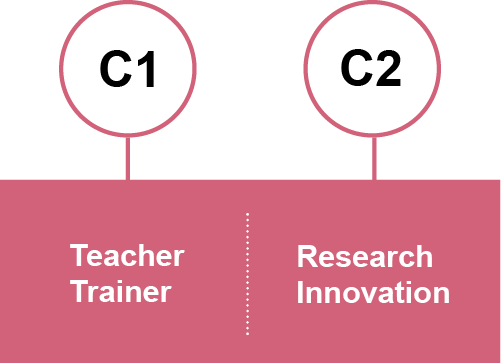Area 6. Facilitating Leaners’ Digital Competence
The digital competence of teachers is important to support and facilitate the development of students’ digital competence.
Competency level statements are organised according to the increasing level of student participation and the complexity of digital competence in the designed learning activities.
Digital competence is one of the transversal competences educators need to instil in learners. Whereas fostering other transversal competences is only part of educators’ digital competence in as far as digital technologies are used to do so, the ability to facilitate learners’ digital competence is an integral part of educators’ digital competence. Because of this, this ability merits a dedicated area in the DigCompEdu framework.
6.1 Information and media literacy
Description. To design, implement and integrate, in the teaching and learning processes, pedagogical proposals for the development and evaluation of the digital competence of students in media literacy and in the treatment of information and data.
A
Knowledge and guided application of pedagogical strategies to integrate, in the teaching and learning processes, the curricular aspects of digital competence on media literacy and in the treatment of information and data of students.
B
Design and integration of learning situations to develop the digital competence of students in information and data processing.
C
Research and innovation in the design of pedagogical strategies for the development of students’ digital competence in media literacy and in the treatment of information and data.
6.2 Digital communication and collaboration
Description. To design, implement and integrate, in the teaching and learning processes, pedagogical proposals for the development and evaluation of the digital competence of students in communication and collaboration, using technologies and respecting the digital label, as well as for the construction of a responsible digital citizenship and identity.
A
Knowledge and application, in controlled environments, of pedagogical proposals to integrate into the teaching and learning processes the curricular aspects of the digital competence of the students on communication and collaboration and on citizenship and digital identit.
B
Design and integration of learning situations to develop students’ digital competence for communication, collaboration and citizen participation and for the creation of their digital identity.
C
Research and innovation in the design of new pedagogical strategies for the development of students’ competence for communication, collaboration, and participation in digital environments.
6.3 Digital content creation
Description.To design, implement and integrate, in the teaching and learning processes, pedagogical proposals for the development and evaluation of the digital competence of students in the creation and reworking of digital content, including programming and content or functionalities to create or edit emerging technologies, applying copyright, and intellectual property rights.
A
Knowledge and guided application of pedagogical strategies to integrate into the teaching and learning processes the curricular aspects of the digital competence of students for the creation of digital content.
B
Design and integration of learning situations to develop the digital competence of students in the creation of digital content.
C
Applied research and innovation in the development of didactic proposals to stimulate creativity in the expression of ideas and knowledge through the development of digital content by students.
6.4 Responsible use
Description. To design, implement and integrate, in the teaching and learning processes, pedagogical proposals for the development and evaluation of the digital competence of students in the safe, responsible, critical, healthy, and sustainable use of digital technologies.
A
Knowledge and guided application of pedagogical strategies to integrate into teaching and learning processes the curricular aspects of students’ digital competence on safe, responsible, critical, healthy, and sustainable use when using digital technologies.
B
Design and integration of learning situations to develop the digital competence of students, so that they make a safe, responsible, critical, healthy, and sustainable use of digital technologies.
C
Research and innovation in the design of pedagogical strategies for the development of students’ competence in the use of technologies in a safe, responsible, critical, and sustainable way, and to safeguard their own well-being and that of others.
6.5 Digital problem solving
Description. To design, implement and integrate, in the teaching and learning processes, pedagogical proposals for the development and evaluation of the digital competence of students in the use of digital technologies to solve everyday problems and develop, as a consumer, in a creative and critical way in a digitised world.
A
Knowledge and guided application of pedagogical strategies to integrate into the teaching and learning processes the curricular aspects of the digital competence of the students to understand the functioning of technologies and act as a consumer in a digital society.
B
Design and implementation of pedagogical strategies to integrate into the teaching and learning processes the curricular aspects of the competence of the students to understand the functioning of technologies and act as a consumer in a digital society.
C
Research and innovation in the design of pedagogical strategies for the development of students’ competence to understand the functioning of technologies and act as a consumer in a digital society.






